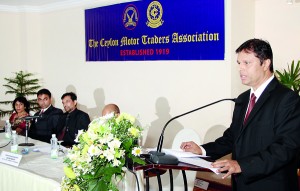Motor traders urge government to reduce taxes on commercial vehicles
View(s):Sri Lanka’s motor traders badly hit by tax hikes are to make representations to the Treasury Secretary Dr. P.B. Jayasundera seeking a reduction in taxes at least on commercial vehicles as the trade is on the verge of collapse.
They noted that the country’s revenue dropped by 43.8 per cent to US$498 million last year as a result of the decline in vehicle imports and sales in the country owing to high taxes.

Mr Tilak Gunasekera
Ceylon Motor Traders Association (CMTA) President Tilak Gunasekera told the Business Times on the sidelines of the association’s recently held 53rd Annual General Meeting in Colombo that the trade received another beating when the government increased the excise duty on single cab which is a commercial vehicle by 126 per cent.
“The issue that we are focusing on currently is the 15 per cent duty on commercial vehicles like trucks. We are critical of this move by the government because the use of commercial vehicles has a direct beneficial impact on the country’s economy,” he added.
He also noted that around June 2012, when the Association was made to understand that there was a strong possibility that the Government was proposing to introduce a Rs.50 million annual license fee to be charged from franchised vehicle importers, the CMTA was able to successfully persuade the authorities to remove such proposal.
Likewise he expressed the belief that the association will be able to prevail on the Treasury authorities to find some redress for them by reducing or removing some of these heavy taxes.
The Government increased excise duties on vehicles in March 2012 to discourage imports with the hope that this will curtail the widening trade deficit.
Further, the rupee experienced a sharp decline following the decision taken by the Central Bank to stop intervening in the foreign exchange market and also imposed a credit ceiling on loans extended to the private sector, the cost of borrowing increased and fuel prices experienced a sharp rise.
“All these negative developments had an impact on the vehicle business in the country from the second quarter of 2012. As a result of the revision in excise duties, vehicle registration for brand new motor vehicles reduced significantly by 25 per cent,” Mr. Gunasekera, re-elected as the CMTA Chairman for the year 2013/2014, stated.
Subsequently, prices of vehicles rose across the board, with duty on cars increasing to between 200 to 291 per cent, whilst the SUV category increased from 100 per cent to 173 per cent.
Duty on three-wheelers also nearly doubled to 100 per cent.
The new tax regime resulted in an erosion of sales of up to 40-50 per cent in the motorbike category, 70 per cent in cars and an overall 50 per cent drop in vehicle sales across all segments, he revealed.
Follow @timesonlinelk
comments powered by Disqus


